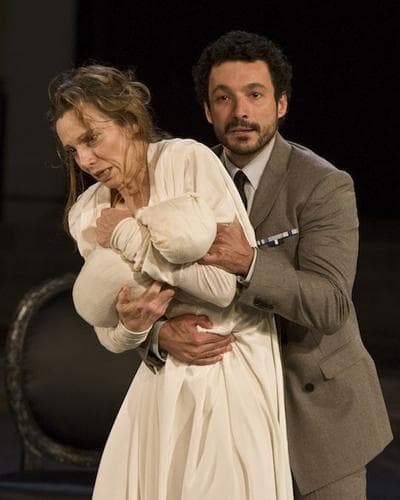Advertisement
The Cycle Of Violence — A Universal Tragedy
BOSTON – It’s hard with the tragedy of the Marathon bombings to remember that we are not alone when it comes to mindless violence, that there are over 25 wars raging in which madness and murder are the currency of the day.
It’s probably not a point lost on anyone witnessing the SITI Company’s remarkable production of Euripides’ “Trojan Women,” so smartly adapted by Jocelyn Clarke and directed by Anne Bogart, the company’s artistic director. And those are just the “auteurs” behind the production, SITI is a more collaborative company than most and the ensemble work by the actors along with musician-composer Christian Frederickson and the designers make this a show that adds more glory to ArtsEmerson.
Rob Orchard, the executive director, has a long history of bringing Bogart’s work to the area, both at the American Repertory Theater and at Emerson. I can’t say that I’ve loved all her work, but I’ve always admired the imagination and commitment to expanding the theatrical vocabulary that she brings to the table.
And I do love what she and the company have done to “Trojan Women (After Euripides).” For those who don’t know the story, the time is after the fall of Troy and the Greeks are out for blood. Hecuba has lost her husband, King Priam, and her sons, Paris and Hector, as the play opens. Things don’t get any better for her as the play progresses.
Whether Euripides meant it to be a commentary on the horrors of war or not, that’s what “Trojan Women” has become in contemporary times, certainly from Jean-Paul Sartre onward. Parallels to the Middle East, the Balkans and Africa are everywhere in the text and adapters, from Sartre onward, have not been hesitant to hammer those parallels home.
Clarke and Bogart don’t bring any hammers to the Paramount mainstage. Its sparseness, its quietness, its love of the classics, its basic humanism speak volumes about violence begetting violence. Many of those same attributes may leave theatergoers looking for something louder unsatisfied. But there’s a theatrical wisdom onstage that cries out for an end to war, with the quiet surrender of a baby here and a wail to reach the heavens there. The stage is opened up to expose the back wall and the main piece of scenic design is a makeshift mound of dirt.

That’s all that this fine ensemble needs. Ellen Lauren as Hecuba was in a class by herself as far as the opening-night audience was concerned and her descent into madness at the loss of family and country is certainly wrenching, but the standard of acting by the whole company is on the same high level, from the victimized females (Katherine Crockett’s Helen would have us believe she’s one of them) to the Greek men who are all too skilled in the wiles of war, particularly Gian-Murray Gianino’s Odysseus.
Clarke gives them a lot to work with. His language is not particularly classical and not particularly contemporary. He obviously respects the story’s classical roots, but never lets it turn into a museum piece. The progression is relentless enough without jumping through hoops.
There’s plenty of hoop-jumping at local theaters these days — “Ryan Landry’s ‘M,' " “Beowulf: A Thousand Years of Baggage,” and next door to the Paramount with “The Book of Mormon.” But the Siti Company and ArtsEmerson know that in the quest for great theater, it’s often better to leave the baggage and the hoops offstage.
This program aired on April 19, 2013. The audio for this program is not available.


